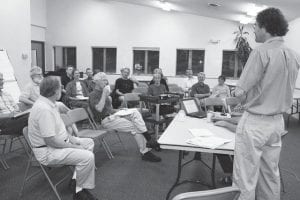Citizens from around the county attended a meeting on August 23 at the Cook County Community Center on implementation of the Cook County Energy Plan recently adopted by the Grand Marais City Council and the Cook County Board of Commissioners. A survey conducted in the development of the plan showed that a lot of residents are interested in increasing energy efficiency and using renewable sources of energy. The survey also showed that the costs associated with increasing efficiency and investing in renewable energy are large factors in making energy decisions. Implementation of the Energy Plan is expected to involve a lot of community education.

About 20 people attended an August 23 presentation on the new Cook County Energy Plan adopted this summer by the Grand Marais City Council and the Cook County Board of Commissioners.
“We have an energy plan,” said Cook County Local Energy Project (CCLEP) organizer George Wilkes. “So now what do we do?” Implementing the program will take community effort, he said. It’s a long process and it’s just beginning.
“It’s kind of a win-win situation,” Wilkes said. “There are just so many reasons to implement renewable energy and energy efficiency.”
According to the plan’s executive summary, “The purpose of this project is to better prepare our community for the challenges and opportunities of a rapidly changing energy environment.
“…The vision driving development of the Energy Plan is to make Cook County and Grand Marais a more energy conscious community and a leader in energy efficiency and renewable energy with both the county and city working continuously and methodically toward an ultimate goal of energy independence.”
Energy Plan Coordinator Don Grant said a survey conducted as part of the development of the plan indicated strong support for renewable energy, although costs are a major factor in actually implementing the plan. The people who self-selected by answering the survey online scored only slightly higher in their interest in renewable energy than those who were phoned randomly, he said.
“The public input revealed widespread concern by Cook County residents about energy issues, especially energy costs and environmental impacts,” the study’s executive summary states. “A large majority of residents were in favor of increased energy efficiency and renewable energy development, and a similar majority was in favor of local governmental action to facilitate that development.
“Results also showed that economic considerations are a big driver in making energy efficiency and renewable energy investments.”
CCLEP Coordinator Virginia Danfelt will be working on helping the community implement the plan. “There’s a lot of potential for grants,” Wilkes said.
The Energy Plan will be reviewed every other year or so, Wilkes said, and “changes that make sense” will be made.
The group discussed energy reduction incentives offered by the Grand Marais Public Utilities Commission (PUC) and Arrowhead Electric Cooperative Inc. (AECI). City Councilor/PUC Commissioner Tim Kennedy said offering these incentives is cheaper than building new power plants to meet a steady increase in demand for power.
One person in attendance said local homeowners do not have any incentive for having renewable energy systems (such as solar) capable of sending electricity back to AECI’s grid because they still have to pay a minimum fee each month even if they are producing electricity rather than using it off the grid. In addition, he said, the utility cooperatives have long-term agreements with Great River Energy (AECI) and Southern Minnesota Municipal Power Agency (SMMPA) that they will buy no more than 5 percent of their energy from other sources.
Wilkes said he hopes power cooperatives and public utility commissions will move toward making use of renewable energy. Over time, more and more trends or pressures will force changes in this direction, he said. Already, Minnesota power cooperatives will be required to obtain 25 percent of their power from renewable resources by 2025. One resident said Ottertail County has a lot of energy reduction incentives for residents. Don Grant said two plants in the Twin Cities burn garbage cleanly and create electricity in the process.
Other ideas brought up at the meeting include the following:
. Planning and building municipal infrastructure that would encourage increased use of our own bodies for transportation such as by walking and biking.
. A loan program to help residents invest in renewable heat sources such as pellet burners and solar panels.
. Reducing water loss in the city of Grand Marais’ underground piping system to reduce the energy used in pumping and filtering the water.
Cook County’s energy use results in emissions of about 93,000 tons of carbon dioxide a year, and residents spend about $14,500,000 on energy. Energy use is split fairly evenly between the commercial and residential sectors.
“Of course, the true measure of success of this plan will be the extent to which this voluntary plan is accepted and incorporated into our community’s culture,” the executive summary states. “Real, effective implementation of this Energy Plan will come through a prolonged and diligent process of community education.”


Loading Comments